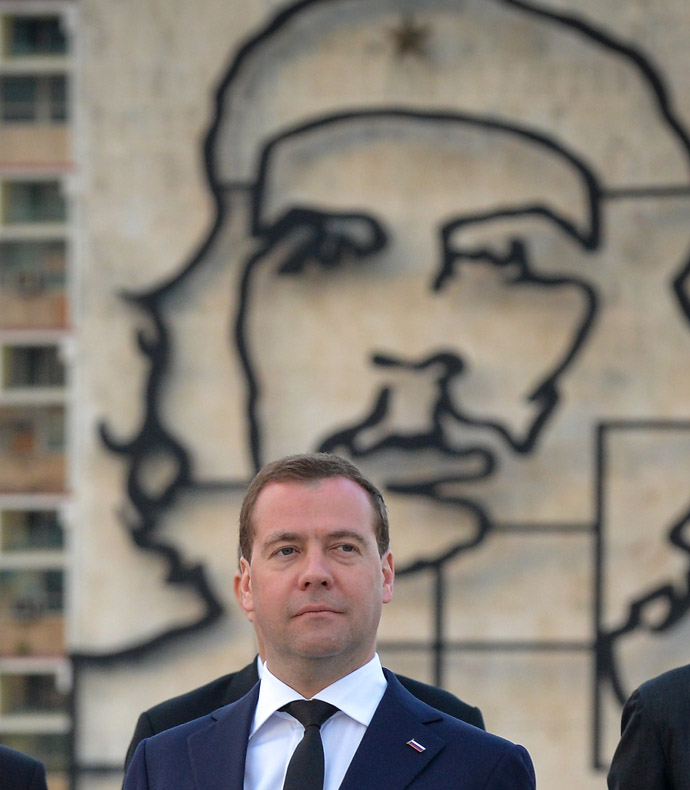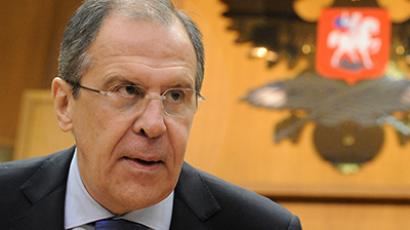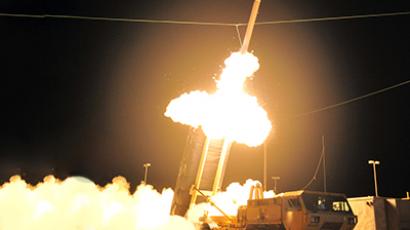Time running out for US missile shield deal – Medvedev
The window of opportunities to reach consent on the US missile shield in Europe is elapsing, PM Dmitry Medvedev told Cuban media, as Russia will have to retaliate to protect national strategic interests - no matter who is in charge in the Kremlin.
Russia and the US should reach an agreement on the American missile shield being deployed in Europe before 2020, or it will become meaningless, said Medvedev in an exclusive interview to Prensa Latina news agency.
“While serving my presidential term I specified that we’re approaching the event horizon for this decision, which is the end of this decade, maybe even a bit earlier,” Medvedev said.
“If we cannot make a deal, the consequences for the international relations are going to be highly unpleasant, because we will have to adopt retaliatory measures. Any Russian government or head of state will riposte, simply because this is in our strategic interest,” Russian PM explained.
Dmitry Medvedev acknowledged that the missile shield issue remains the main stumbling block in Russia-US relations and little progress has been reached so far.
“Unfortunately, all our efforts to explain to the Americans that European missile shield in its current form is aimed against Russia, its nuclear capabilities and undermines world’s nuclear balance have been in vain. Our arguments have been heard neither in America nor in NATO,” Medvedev said.
“They try to soothe us saying this is against ‘some other states’. Unfortunately, such speculation does not appear convincing for us. We have delivered our arguments before,” Russian PM argued.
At the same time Dmitry Medvedev confessed that he felt comfortable working with the Obama administration. As concrete results of Russian-American cooperation Medvedev named New START (Strategic Arms Reduction Treaty) signed in 2010 and Russia finally joining the World Trade organization in 2012, which Washington has assisted strongly.
The Russian PM expressed confidence that President Vladimir Putin has comfortable relations with the current American administration too.
Among other issues troubling Russian-American relations, Dmitry Medvedev named the so-called Magnitsky law that replaced the discriminatory Jackson-Vanik amendment, limiting trade between Russia and America.
“We have had to retaliate, like adopting a law on liability for violation of human rights and interests of Russian citizens. Is it good or bad? It is not good. But the less causes for such actions are created the better, both for the Russian-American and international relations as such,” he noted.
‘Latin America is area of Moscow's strategic interest’
Russia considers Latin America to be a region full of friendly nations and Moscow is set to develop long-term strategic relationship and back mutually beneficial interests, Medvedev said.
“We simply believe that a number of countries here are our friends, with which we are developing full-scale cooperation,” Medvedev said, stressing that this cooperation is not opportunistic in nature.
Latin America is a rapidly-developing region with promising economic prospects, he said, stressing that the time has come to address the region’s problems together.
"This is an area of our strategic partnership interest, and we have a broad range of diplomatic and economic relations with the countries of the region - precisely due to this reason," Medvedev said.
He acknowledged that Russia had to suspend its activities in Latin America in the 1990s because of the difficult internal economic and political situations.
"That was due to our internal problems. We were not strong enough to develop our own country. There is no secret that international relations require serious economic potential, political will, and diplomatic activity [which Russia lacked in 1990s]. But these times are gone,” Medvedev declared.
Today Russia is building active relations with most Latin
American countries, including the region’s biggest economy Brazil -
which together with Russia is a member of BRICS economic
partnership - and also Argentina, Chile, Venezuela, Ecuador, and
most naturally with Cuba, which is “dear to the heart of each
Russian," he said.
With many countries Russia has better relations than the Soviet Union used to have, the PM noted.
"We are here to stay and want our relations with countries of
the region to be excellent,” Medvedev concluded.















